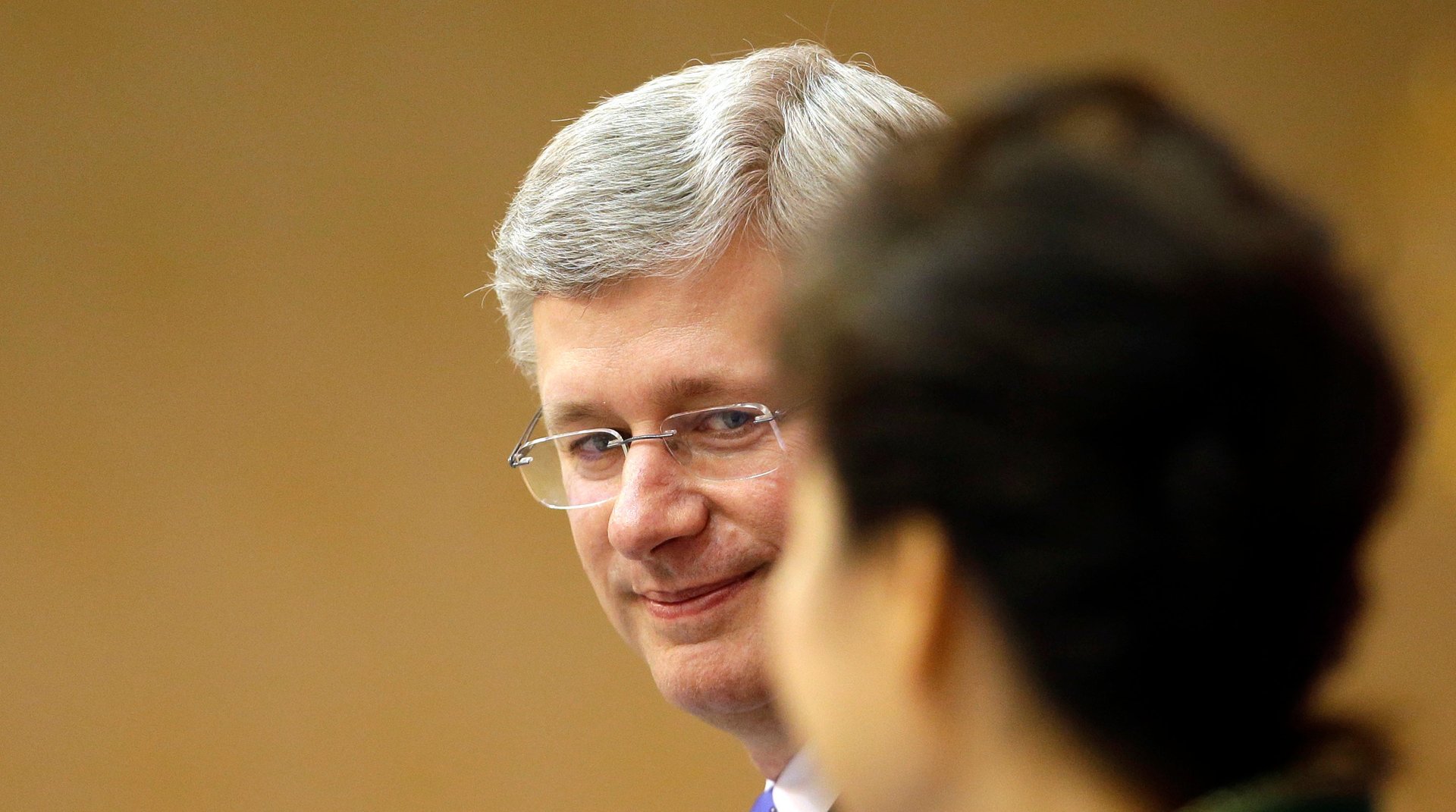Canadian voters just took a bold stand against Stephen Harper’s Islamophobia
America is often described as an outlier among industrialized democracies, especially when it comes to gun violence and religiosity. Here’s another way we’re outliers: We elected the son of a Kenyan Muslim, and are becoming an increasingly progressive country. Meanwhile it could be argued that our fellow Western democracies are actually moving in the opposite direction, indulging and even rewarding anti-immigrant, anti-Muslim sentiment.


America is often described as an outlier among industrialized democracies, especially when it comes to gun violence and religiosity. Here’s another way we’re outliers: We elected the son of a Kenyan Muslim, and are becoming an increasingly progressive country. Meanwhile it could be argued that our fellow Western democracies are actually moving in the opposite direction, indulging and even rewarding anti-immigrant, anti-Muslim sentiment.
Yesterday, voters in Canada headed to the polls to decide whether the Conservative prime minister Stephen Harper deserved another term in office. Harper ran on Islamophobia—and in a heartening if somewhat surprising display, Canadians ran him out of office.
Most Americans probably think of Canada the way we do Scandinavia: cold, prosperous, clean, safe, polite. Maybe for that reason, we don’t pay close attention to the politics of our northern neighbor, even as they have veered ever more to the right.
Under Harper, Canada abandoned its traditional preference for nuanced diplomacy, becoming a more aggressive player in Middle Eastern politics, uncritically siding with Israel while turning hostile to refugees fleeing conflict in Syria. Harper has not only tightened restrictions on asylum applications, but even tried to prioritize non-Muslim applications. In marked contrast, none of the Muslim-majority countries welcoming far larger numbers of Syrian refugees, like Turkey, Lebanon or Jordan, has made entry conditional on being Muslim.
It gets worse. The Harper administration has passed its own draconian version of the Patriot Act, and promised a “barbaric cultural practices hotline” where neighbors could report worrying behavior (presumably “barbaric” in this case is Harper’s politically incorrect descriptor for Muslims.)
Naheed Mustafa, a freelance journalist specializing in Canadian and Muslim affairs, described this latest contest as “the longest campaign in Canadian history”—78 days of campaigning in total And, as the Torontonian told Quartz, such a long slog necessitated drastic measures. “How does one sustain moral outrage for that long a period? Find a common cause. Conservatives ran on security—physical and also cultural. Muslims became the target.”
The campaign was indeed an ugly one. Conservatives invoked historic anti-Muslim sentiment in immigrant communities (say, tensions between Hindu and Muslim South Asians), trying to divide and conquer. But the issue was niqab, the face-veil a (very small) minority of Muslim women wear. Though reasonable accommodations could be made for women who asked to take the oath of citizenship while veiled (for identification purposes, these women would present themselves before female officers), Harper flat-out refused. He defined such behavior as fundamentally un-Canadian.
The majority of Canadians appeared to agree that the veil should not be worn at such ceremonies—especially in Quebec. Liberal Party’s leader Justin Trudeau, however, disagreed. The son of Canada’s Franklin D. Roosevelt, the charismatic, youthful candidate didn’t just come from behind and win. His party won a majority, which is a very big deal in a parliamentary system.
This was much more than just a political flip-flop, this was a strong slap in the face of extremism.
Some Muslims never tire of insisting that the West and Islam are at odds. And sure, there’s still a lot of anti-Muslim sentiment out there. But in Canada—and the United States—the xenophobes are still struggling to get on the board when it counts. America elected a guy named Barack Hussain Obama. Twice. Justin Trudeau won, and Stephen Harper lost, in an election that focused, in great measure, on what kind of country Canadians wanted. This is the kind of lesson that will help build up positive Muslim voices, and drown out the cynical, self-defeating or even outright hateful kind.
As Mustafa explained: “The campaign showed Muslims that if they didn’t participate, they would be sidelined, and the Islamophobia would get worse. It was good to see so many young Muslims engage in an open and active way.”
We also found an argument even Islamophobes can’t ignore: Election results.
Harper painted Islam as foreign. He borrowed from stereotypes of Muslims as universally theocratic. While American Republicans and Canadian Conservatives fall over each other hyping the internal Muslim threat, American and Canadian Muslims are jumping into politics, and (not coincidentally) often throwing their support behind left-wing progressive parties.
“Only 38% of Canadian Muslims,” The Intercept’s Murtaza Hussain (himself Canadian) told Quartz, voted in the last election; “it’s way up” this time around. Most of these Muslims, Mustafa and Hussain both agreed, went for the Liberal party (or the other left party, the New Democratic Party). The Muslim voting bloc is finally finding its voice, and not a moment too soon.
In his victory speech, Trudeau let Canadians know about a Muslim woman who voted for him because she hoped her daughter would live in a country of religious tolerance.
Welcome back, Canada. We missed you.